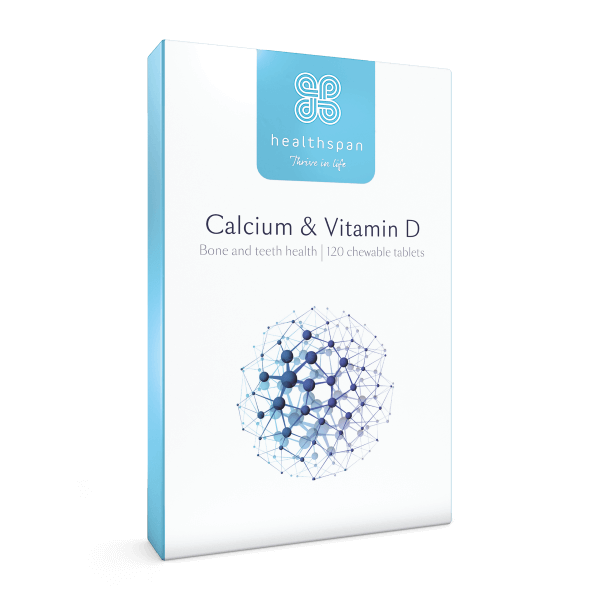Most of us grow up being told to drink plenty of calcium-rich milk to give us strong and healthy bones and joints. This bone-boosting mineral is crucial not only for joint health, but also for healthy teeth, making sure your blood clots normally and ensuring the smooth running of muscle contractions – including keeping your heart beating normally.
Though our bones are natural stores of calcium, we can't actually make the mineral, so levels need to be constantly maintained through our diet. Most of us manage this well enough, but if we don't get the necessary amount our body needs it starts to take it from our bones.
Over time, this can cause them to weaken and become more prone to breaking. What's less widely known, though, is that having too much calcium can be as detrimental as having too little. In fact, it can even lead to a range of health problems, including joint pain. Here, we'll take a look at whether too much calcium can affect your joint pain - and how to balance it.
Are you getting enough calcium?
It's well established that a lack of calcium (which is sometimes due to a lack of vitamin D which is vital for calcium absorption) can lead to bone loss conditions like rickets in children (where bones soften and weaken, often causing them to become bow-legged), and osteomalacia (a similar bone-weakening condition) or osteoporosis (porous and thinning bones) in adults.1 Too little calcium can also potentially lead to tooth loss, insomnia, hypertension (high blood pressure) and muscle cramps and tenderness.
Over time, it can also result in a calcium deficiency disease known as hypocalcemia. In its early stages there may be no symptoms, but as the condition becomes more severe it can result in confusion and memory loss, depression, numbness and tingling felt in the hands, feet and face, in addition to muscle spasms and cramps.2 We're all at an increased risk of calcium deficiency as we age - not least because as we get older it can start to leach from our bones. For women, this can also be the result of hormonal changes (notably post-menopause), but some medications can also stand in the way of calcium being properly absorbed and used, and if your diet is dairy free or vegan you may also be more at risk.
How much calcium do you need?
The UK government recommends 700mg daily for adults, while the European Food Safety Authority and the United States set their recommended daily intake at 1,200mg.3 Most of us should be able to get this amount from our food, with good sources including dairy products like milk and natural yogurt, in addition to nuts, figs, leafy green vegetables like kale and broccoli, soybeans, tofu, soya drinks with added calcium, fish with soft, edible bones like pilchards and sardines, and some fortified milk drinks.
To help get an idea of what 700-1,200mg looks like: an 8oz glass of milk or fortified soya milk contains around 300mg calcium, an 8oz pot of low-fat fruit yogurt will give you around 345mg, and a 3oz serving of sardines with a large green salad should provide you with around half of your recommended daily intake.4
To help it on its way, calcium works with other nutrients to increase its absorption - notably vitamin D.5 Taking calcium with vitamin D is said to boost absorption levels by as much 65 percent. Our bodies create vitamin D naturally when exposed to sunlight, but this can be in short supply in the UK, which is why the National Institute for Health and Care Excellence (NICE) recommends adults supplement with 10mcg of vitamin D daily all year round.6

Calcium and Vitamin D
Chewable tablets for bone and teeth health
- Calcium and vitamin D to support teeth and bones
- Added vitamin K to help maintain bone health
- Helps reduce the loss of bone mineral linked to menopause
Too much of a good thing?
If you're worried you're not getting enough calcium, the solution is not quite as simple as knocking back extra calcium supplements. There's no benefit in taking more than you actually need. In fact, this can actually create health problems. One of those is a rare condition called hypercalcemia which is caused when deposits of calcium build up in your blood which your body can't regulate.7
Taking too much vitamin D or calcium supplements can also raise calcium levels too high, which may increase the risk of kidney stones and, possibly, of coronary heart disease - especially if intake of vitamin K (which help to prevent calcium deposition in arteries) is too low.8 Regularly taking over the counter antacids for indigestion and acid reflux can also lead to higher levels as these contain calcium carbonate.
Getting the balance right
If you're eating a healthy balanced diet, then you might not need to worry about taking a calcium supplement. A supplement is generally recommended during pregnancy, post-menopause, and for the over-60s, and should be in the form of a low dose or divided capsule. It's important to remember that calcium is better absorbed in small doses and is also best taken with meals, as eating encourages the production of stomach acid which helps with the absorption of the mineral.9
Ultimately, being mindful of your calcium levels is just one of the ways to improve your bone and joint health. Eat a varied and balanced diet, take regular weight-bearing exercise to improve muscle strength like yoga , keep your weight down to help take the strain off your joints, and reduce your salt intake.10
If you're interested in learning more about how to keep your joints healthy, select Joints from the Your health menu above.






